By: Hayden Eric Godfrey
Fellow Icelanders,
The task of the authorities over the coming days is clear: to make sure that chaos does not ensue if the Icelandic banks become to some extent non-operational. For this the authorities have many options and they will be used. Both in politics and elsewhere it will be important to sheathe our swords. It is very important that we display both calm and consideration during the difficult days ahead, that we do not lose courage and support each other as well as we can. Thus with Icelandic optimism, fortitude and solidarity as weapons, we will ride out the storm.
God bless Iceland [1] Prime Minister Geir Haarde, 6 October 2008
The connection between political corruption and popular mobilization against a small cadre of rulers is a tale as old as the concept of government itself. From the French Revolution of 1789, in which mobs of starving peasants took to the streets in a revolt against the ancient political order that took the blame for their destitution, to the age of extremist politics that emerged out of the Great Depression of the 1920s and 30s in Europe, this relationship rears its head in frequently dramatic fashions that reorient the power dynamics within society. In recent times, however, this revolutionary spirit has been absent in the majority Western societies, in which oligarchic domination of the political systems has created paradigmatic complacency in regard to a corrupted, broken status quo within their political economies.
The 2008 global economic meltdown falls into this vein of severe economic crises that have spawned political action in their wakes through movements as diverse as the Occupy Wall Street protests in the United States and the May Day Protests throughout Europe and Asia. These demonstrations garnered the popular support of representatives from all strata of their respective societies who sought to alter existing socioeconomic paradigms in order to grant more favor to those without much financial interest in concentrating political power at the top of the market. In addressing the contemporary issues of corrupt political oligarchies that still dominate American politics in 2016, particularly after the release of the Panama Papers, which implicated a number of American politicians in corrupt economic practices, one must look toward Icelandic reactions against political corruption throughout recent history as a model for how to dispose of this broken system.
The Icelandic case stands apart from other events in the larger scheme of political reactions in the wake of the 2008 crash around the globe. The economic crash of 1929 brought with it an era of political radicalism unlike any other in the modern era, catalyzing an age of extremist “isms” in its wake. In stark contrast, the crash of 2008, the largest economic collapse since the Great Depression, was followed by a period of relative adherence to an undeniably broken status quo all around the world. Iceland, however, emerges as the rogue child of the Western economies if one examines this paradigm of political stability in the West. The dishonest dealing tactics of Icelandic bankers and businessmen through the 1990s and 2000s brought wealth to the nation, but at the cost of entangling the Icelandic people in an economic soufflé of debt that was bound to implode at the slightest shock. In 2008, that shock came in the form of a surge – the global economy that rose in the second half of the 20th century plummeted into oblivion. With the influx of foreign funds into the relatively unfettered Icelandic market that existed before 2008, the quality of life that the average Icelander experienced reached unprecedented heights due to the affluence that this relatively delicate system brought to Iceland.[2] As part of the globalized economic system, however, Iceland’s relatively weak currency, the Icelandic Króna, was subjected to the dramatic ebbs and flows inherent to a market in which larger monetary units the likes of the American Dollar and the Euro set the standard.
The 2008 global economic crisis was particularly vicious toward the small Icelandic economy, devaluating the Icelandic Króna to the point at which the nation was forced to declare bankruptcy. Icelandic economist Ásgeir Jónsson commented in his 2009 analysis of the crash, Why Iceland?, “Large reserve currencies… are always more liquid than small currencies, which means that in financial panics the small fry inevitably suffers as money rushes toward security. It follows that in ‘small’ currency areas, currency and banking crises are twin sisters, the former preceding the latter.”[3] Before 2008, Iceland enjoyed the prestige of maintaining one of the highest standards of living in the world, a system in which its population received the benefits of an expansive social welfare state. Iceland’s monetary system fell victim to the economic crisis as foreign investors promptly withdrew their deposits from the international banks in Reykjavík, sucking the Icelandic Króna’s value dry in the process. The conservative coalition in power agreed to foist the debts that the corrupt international banking system incurred upon the Icelandic taxpayers, each of whom would have been required to repay around €330,000 to foreign investors. This unscrupulous political act precipitated outrage in the form of massive protests against the conservative government, which ultimately led to its complete disposal in the early months of 2009.
In order to fully comprehend the nature of the Icelanders’ history of political mobilization before 2008 and 2009, one must first look to the protests of March 1949 against the presence of NATO in Iceland and the Anglo-American coercion of Iceland, a relatively small nation, into becoming one of the organization’s signatory members. Iceland, in other words, had absolutely no say in the matter of whether or not its people wished to belong to the American-led treaty organization. Many of the Icelanders present in the streets of Reykjavík in January of 2009 drew their spirit from this history. As a people, they felt the negative attributes of corrupt globalization as an inescapable aspect of their daily lives. These Icelanders included Hörður Torfason, the man who led the appropriately named activist movement Raddir Fólkssin (translating to “the voice of the people). Torfason’s movement was responsible for the direction that the protests took toward the ultimate replacement of the libertarian-leaning government that allowed for the extensive economic corruption to come into being.[4] The events that took place in 1949 in many ways paralleled the interactions that occurred between crowds and police forces in 2009.[5] Members from all walks of society, from students to the elderly, joined in these protests against an international system which they viewed as a corrupt paradigm in which they as individuals had no voice.
The events as they occurred in Iceland were the initial symptoms of a larger wave of political action across the globe in the wake of the 2008 financial crisis, whose politicians took an alternative path to that which other nations took in the following years. The Icelandic situation represents a microcosmic laboratory of the processes that continue to affect the global economy and the societies that live beneath the constant ebb and flow of deregulated markets. Iceland, once effectively in national bankruptcy, recovered far more rapidly and effectively than any of the other nations to have been afflicted with economic and political trauma after 2008 in what the international media has referred to as an “economic miracle”.[6] In more recent news, the release of the Panama Papers to the public has implicated countless politicians from around the world in economically unsavory practices, including the newly resigned Icelandic prime minister, Sigmundur Davíð Gunnlaugsson. The Icelanders again took to the streets in order to protest an international system of corruption that has served to the detriment of the majority of the world’s population through illegal tax evasion and the creation of offshore bank accounts for the benefit of the wealthy.[7] Perhaps it is time that the rest of the world turns its eyes to this frequently neglected corner of the globe for ethical guidance in its grand affairs.
The Icelanders’ political demonstrations this year forced the resignation of their prime minister after he was named in the Panama Papers. The majority of Americans, on the other hand, have remained silent to the corruption that exists within our own country. This silence perpetuates corrupt political and economic practices that we as a people must combat in order to engage with the world post-2008. Iceland provides an example of how popular movements can resist oligarchy disguised as democracy, even in today’s global world, provided the danger is well-understood. Icelanders, as a people, are keenly aware of how political corruption and established economic interests can impose a socioeconomic system in which the voice of the majority is ignored. As a result Icelanders from all walks of life were and are ready to take to the streets. We need to learn from this example if we want to seize our government by the reins.
Hayden Eric Godfrey graduated from UC Berkeley in 2014 with a BA in History, German Studies, and Music Performance. He is an incoming MA candidate and a Max Kade Fellow with the University of Arizona.
[1] Geir Haarde, Address to the Nation by H.E. Geir Haarde, Prime Minister of Iceland (6 October 2008), Office of
the Prime Minister, http://eng.forsaetisraduneyti.is/news-and-articles/nr/3035
[2] Guðni Thorlacius Jóhannesson, The History of Iceland, (Santa Barbara: Greenwood, 2013), 119.
[3] Ásgeir Jónsson, Why Iceland? (New York: McGraw-Hill, 2009), 159-160.
[4] Hörður Torfason, interviewed by Hayden Eric Godfrey, Berkeley, California, 30 March 2014.
[5] Velur Gunnarsson, “Iceland’s Coalition Struggles to Survive Protests”, The Guardian, 21 January 2009,
http://www.theguardian.com/world/2009/jan/22/iceland-protests-recession
[6] Ben Whitford, “Iceland: An Economic Miracle”, Positive News, 18 June 2013,
http://positivenews.org.uk/2013/economics_innovation/12895/iceland-economic-miracle/
[7] Keri Phillips, “Why Iceland Reacted so Fiercely to the Panama Papers”, Radio National. 26 April 2016,
http://www.abc.net.au/radionational/programs/rearvision/why-iceland-reacted-so-fiercely-to-the-panama-papers/7357692.
(Image: Demonstrations in Reykjavik, by Magnus Fröderberg/norden.org distributed under a CC BY-SA 2.5 licence.)










I find it funny that people sometimes admire how we handled the 2008 crisis when it’s precisely an excellent example of how Social Democracy is fundamentally liberal and pro-capitalist.
I don’t think that’s the point. The article seems to use the Icelandic example to counter the general apathy toward political corruption that exists in the United States. It’s not a discussion of economic models as much of political activism vs. political apathy.